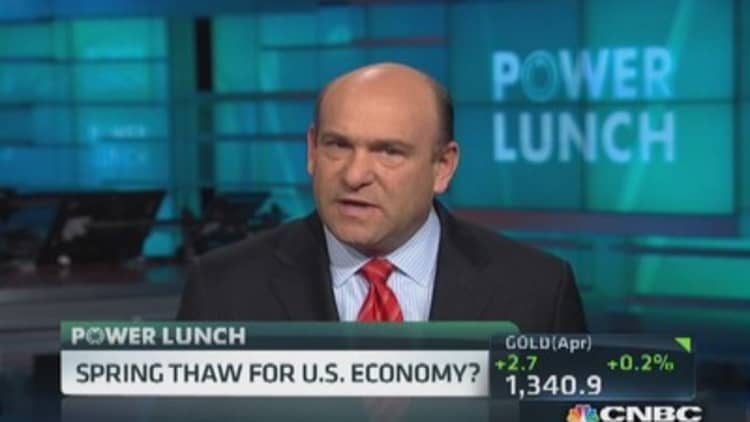Corporate America's love affair with debt has intensified in 2014, with record levels of borrowing happening as feared rate increases have yet to materialize.
This year was supposed to be the one where the rock-bottom rates began to lift as the Federal Reserve eased its foot off the stimulus pedal and economic growth pushed borrowing costs higher.
But rates remain near historical lows, with 10-year levels below 4 percent for the highest-rated bonds, which has served as an invitation to borrow.
Year-to-date, companies have issued $236.6 billion in investment-grade loans, the highest on record, according to ThomsonReuters. Last week alone saw $43 billion put on the market, the second-highest single-week total since at least 1980.
In total, corporate debt among nonfinancial companies has ballooned to $13.6 trillion, increasing 7.1 percent in the fourth quarter, according to the latest Fed data.

Companies have put all that debt—which has increased from about $11 trillion during the darkest days of the financial crisis in late 2008—to a number of uses.
(Read more: Companies not parting with cash as economy wilts)
The most noted from the investor perspective has been the trillion dollars or so that have gone to boost share prices through buybacks. That trend has been especially pronounced in light of the relatively tame levels of capital expenditures, particularly when measured as a share of total revenue. Companies bought back about $115 billion just since mid-December according to market data firm TrimTabs.
Investors increasingly have demanded—as expressed through sentiment gauges such as the Bank of America Merrill Lynch Fund Manager Survey—that companies start using their cash to invest in growth rather than simply returning money to shareholders.
(Read more: Warning signs? Margin debt soars again)
Corporate cash rose to a record $1.98 trillion in the fourth quarter, according to Fed data.
The combination of hoarding cash while continuing to raise debt and not invest in growth has spurred concern about whether companies are using the low-rate opportunity wisely.
"The mantra to always remember is debt is a tax on future income," Steve Blitz, chief economist at ITG Investment Research, said in an interview. "Right now it's an extraordinarily low tax, so they all want to go and buy stocks. It's a reasonable, rational act, but at some point this has to turn to capex."
Blitz compared the buyback bonanza to the housing boom of the previous decade.
While price appreciation and value looked good in real estate, the growth of debt ultimately outpaced returns and owners were left with severely devalued assets.
(Read more: Buying alpha: The easiest way to stock gains)
"The house doesn't produce income," Blitz said. "So how do you justify buying the house with a (highly) leveraged purchase?"
Wall Street analysts, at least, have been bullish in capital expenditures, with expectations in the 7 percent range, up from the paltry 3 percent in 2013.
Goldman Sachs believes the main impetus behind the pickup will be a decrease in economic uncertainty, growth in personal consumption expenditures and a natural lift from the weak 2013 level, which Goldman said was "artificially depressed."
(Read more: What that China debt default means to the market)
"Growth outside of capital spending should rise―due to a combination of lower fiscal drag and gains in consumer spending―inducing higher capital investment," Goldman economist Kris Dawsey said in a note. "The degree of economic uncertainty, both on U.S. fiscal policy and with regard to tail risk scenarios in the euro zone, has declined considerably. The market value of assets relative to their replacement value has risen further."
Similarly, Citiroup believes an amenable credit backdrop will push companies to spend some of that borrowed money on capex and hiring. A note from Tobias Levkovich, Citi's chief U.S. equity strategist, suggests that the dour capex view is overdone and that spending hasn't been as low as perceptions.
"Employment growth tends to be symbiotic with capital investment as companies need to provide workers with the tools they require to do their jobs," Levkovich said. "Accordingly, the economic backdrop is getting that needed boost at the corporate level."
—By CNBC's Jeff Cox. Follow him on Twitter @JeffCoxCNBCcom.






